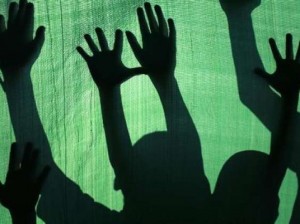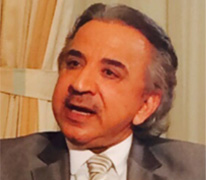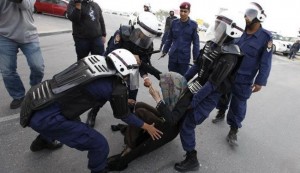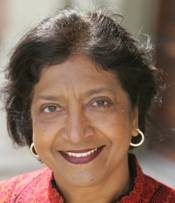HR Issues
-------------------------------------------
---------------------------------------------- UAR the Worst in Slavery List of 2014
 Cairo Gate: the Sun, December 14, 2014
The report, entitled slavery index for 2014, the existence of 36 million people facing a form of slavery in the 167 countries in the world, and the UAE came in first place in the Gulf Region followed by Saudi Arabia.
This was according to the second annual report, issued by the organization «Walk Free», from its headquarters in Australia about the modern "slavery", according to news agencies.
The biggest ratio came in countries such as India, China, Pakistan, Uzbekistan and Russia, and accounted for 61% of those who suffer the modern forms of slavery in the world.
The top GCC figure went to the UAE ; nearly 99 thousand people which gives the percentage 1,057%, especially in light of the frequent talk about foreign labor rights.
And the least percentage in the Gulf was in Bahrain; at the rate of nine thousand and 400 people representing 0.709% ..
At the level of Arab States, the highest percentage of those who suffer form of slavery was in Mauritania and formed a 4% rate of 160 thousand people, the highest number of people suffering from slavery, was in Sudan at a rate of 430 thousand people and 1.13% ..
The report concluded that Iceland and Luxembourg, have less than a hundred people in each, suffering from slavery, the lowest percentage of the phenomenon of slavery in all countries.
According to the report, the modern slavery, includes; human trafficking, forced labor, forced marriage, religious slavery and commercial sexual exploitation.
The general proportions indicated the existence of a form of slavery but does not identify any of them as it does not equate, for example, the offense of trafficking with some diminution of the rights of workers.
With more detail, the largest number of people facing modern slavery, has been recorded in India, 14.29 million people are exposed to modern slavery, and after it China that comes more than three million people, then Pakistan and Uzbekistan, as Nigeria is the largest source of smuggling people into Europe .
On the other hand, the percentage of individuals smuggling for sexual exploitation, the report estimated at about 70%, while 19% are trafficked for forced labor.
The global statistics published for slaves, for the first time, last year, attributed the high number of 2013 to improve the means of investigation and statistics, and not to an increase in the number of slaves.
several international reports spoke on human rights violations in the UAE, especially with regard to foreign workers and the most recent Human Rights Watch report last October, said that domestic migrant workers in the United Arab Emirates exposed to: beating, exploitation, and the siege under conditions of forced labor.
The UAE government has failed, and that it is about to take on a new role and a large influence within the International Labour Organization, in providing adequate protection for migrant domestic workers who come from the Philippines, many of them suffering from abuses of employers and recruitment agents.
------------------------------------------------
Cairo Gate: the Sun, December 14, 2014
The report, entitled slavery index for 2014, the existence of 36 million people facing a form of slavery in the 167 countries in the world, and the UAE came in first place in the Gulf Region followed by Saudi Arabia.
This was according to the second annual report, issued by the organization «Walk Free», from its headquarters in Australia about the modern "slavery", according to news agencies.
The biggest ratio came in countries such as India, China, Pakistan, Uzbekistan and Russia, and accounted for 61% of those who suffer the modern forms of slavery in the world.
The top GCC figure went to the UAE ; nearly 99 thousand people which gives the percentage 1,057%, especially in light of the frequent talk about foreign labor rights.
And the least percentage in the Gulf was in Bahrain; at the rate of nine thousand and 400 people representing 0.709% ..
At the level of Arab States, the highest percentage of those who suffer form of slavery was in Mauritania and formed a 4% rate of 160 thousand people, the highest number of people suffering from slavery, was in Sudan at a rate of 430 thousand people and 1.13% ..
The report concluded that Iceland and Luxembourg, have less than a hundred people in each, suffering from slavery, the lowest percentage of the phenomenon of slavery in all countries.
According to the report, the modern slavery, includes; human trafficking, forced labor, forced marriage, religious slavery and commercial sexual exploitation.
The general proportions indicated the existence of a form of slavery but does not identify any of them as it does not equate, for example, the offense of trafficking with some diminution of the rights of workers.
With more detail, the largest number of people facing modern slavery, has been recorded in India, 14.29 million people are exposed to modern slavery, and after it China that comes more than three million people, then Pakistan and Uzbekistan, as Nigeria is the largest source of smuggling people into Europe .
On the other hand, the percentage of individuals smuggling for sexual exploitation, the report estimated at about 70%, while 19% are trafficked for forced labor.
The global statistics published for slaves, for the first time, last year, attributed the high number of 2013 to improve the means of investigation and statistics, and not to an increase in the number of slaves.
several international reports spoke on human rights violations in the UAE, especially with regard to foreign workers and the most recent Human Rights Watch report last October, said that domestic migrant workers in the United Arab Emirates exposed to: beating, exploitation, and the siege under conditions of forced labor.
The UAE government has failed, and that it is about to take on a new role and a large influence within the International Labour Organization, in providing adequate protection for migrant domestic workers who come from the Philippines, many of them suffering from abuses of employers and recruitment agents.
------------------------------------------------
Bahraini women are most vulnerable to the types of violations compared to the Arab revolutions
Amid silence of the Supreme Council for Women
Bahrain Human Rights Forum date: 11/27/2014 Bahrain Forum for Human Rights reported that Bahraini women who participated in the Rights Movement, since the year 2011 is the most vulnerable in different patterns compared to women in other Arab revolutions, adding that they suffered from the violence of the authorities and the retaliation of physical , psychological torture, abuse of sex and the firing off from business and educational institutions, and arbitrary arrests of nearly 300 detained since 2011. It emphasized in a statement to mark the International Day for the Elimination of Violence against Women, which falls on November 25 of each year that the institutions created by the authority and women are within its jurisdiction, particularly the Supreme Council for Women is still in silence for such violations did not move a finger, which makes these institutions be called into question in the future, both domestically and internationally. The Forum clarified that the violations, particularly arrests affected women in various positions as doctors, teachers and journalists, blogs, employees and students and activists revealing the presence of five women in detention centers in Bahraini prisons ; Nafisa Al Asfour, Rehana Moussawi, Ayaat Al Saffar, Zahra Al Sheikh and Ghada Jamsheer and issuing against them harsh sentences. The Forum invited the United Nations especially the High Commissioner for Human Rights to commit the Bahraini government with international conventions it has signed, especially the International Convention for the Elimination of Violence against Women and the Convention on the Elimination of All Forms of Discrimination against Women also called for authorities to immediately release all detainees in Bahraini prisons and rehabilitation to them, demanding the protection of women's rights in Bahrain and not to violate those rights protected internationally.-------------------------------------------------------------------
Pillay urges review of Egyptian laws and judicial procedures after latest "shocking" conviction of Al Jazeera journalists
GENEVA (23 June 2014) – UN High Commissioner for Human Rights Navi Pillay said she was “shocked and alarmed” by the verdicts and heavy jail sentences of between 7 and 10 years handed down to three Al Jazeera journalists on Monday, as well as 11 other defendants who were tried in absentia. While noting that they are subject to appeal, Pillay said the Al Jazeera verdicts, along with Saturday’s confirmation by an Egyptian court of the death penalty for 183 Muslim Brotherhood members and supporters convicted in an earlier mass trial, are the latest in a string of prosecutions and court proceedings that have been “rife with procedural irregularities and in breach of international human rights law.” The High Commissioner expressed her alarm at the increasingly severe clampdown and physical attacks on both media and civil society activists in Egypt, which is hampering their ability to operate freely. “I am particularly concerned about the role of the judicial system in this clampdown,” she said. “Harassment, detention and prosecution of national and international journalists, including bloggers, as well as violent attacks by unidentified assailants, have become commonplace,” she added, noting that at least six journalists have been killed in Egypt since August 2013. “Media employees trying to carry out their work in Egypt are now confronted by an extremely difficult and dangerous environment. They should be protected not prosecuted.” “The charges levelled against the journalists, which include harming national unity and social peace, spreading false reports, and membership of a ‘terrorist organization,’ are far too broad and vague, and therefore reinforce the belief that the real target is freedom of expression,” Pillay said. She noted that charges based on Egypt’s anti-terrorism law have also been used to bring convictions in a number of other trials, including the two mass trials of more than 1,100 people in Minya earlier in the year that led to at least 220 people being handed death sentences, including the 183 whose death sentences were confirmed on Saturday. “I believe these mass trials and death penalty convictions are obscene, and a complete travesty of justice,” the High Commissioner said. Article 19 of the International Covenant on Civil and Political Rights, a binding treaty that Egypt ratified in 1982, states that ‘Everyone shall have the right to hold opinions without interference. Everyone shall have the right to freedom of expression; this right shall include freedom to seek, receive and impart information and ideas of all kinds, regardless of frontiers, either orally, in writing or in print, in the form of art, or through any other media of his choice.’ “It is not a crime to carry a camera, or to try to report various points of views about events,” Pillay said. “It is not a crime to criticize the authorities, or to interview people who hold unpopular views. Journalists and civil society members should not be arrested, prosecuted, beaten up or sacked for reporting on sensitive issues. They should not be shot for trying to report or film things we, the public, have a right to know are happening.” The High Commissioner urged the Egyptian authorities to promptly release all journalists and other media employees imprisoned for carrying out legitimate news reporting activities, including Mohamed Fahmy, Peter Greste and Bahar Mohamed, the three journalists who were convicted and sentenced on Monday. . “It is the State’s obligation to ensure that the right to freedom of expression is respected, and that journalists are able to report on diverse views and issues surrounding the current situation in Egypt,” she said. “Crushing media reporting will only hinder Egypt’s efforts to come through this period of social and political turmoil.” In the light of the succession of highly contentious trials, especially those resulting in the mass imposition of the death penalty, Pillay urged the Government to review the laws on which the trials were based, and in particular the Anti-terrorism Law and the so-called Protest Law, which, since its promulgation in November 2013, has been used to arrest and convict dozens of protesters, including political activists. “In addition to journalists, several prominent activists have been harshly sentenced in court proceedings that generally fell far short of key international standards for fair trials,” the High Commissioner said, citing the cases of Ahmed Maher, Mohamed Adel and Ahmed Douma, whose convictions, three-year jail sentences and heavy fines were upheld by an appeal court on 7 April. She also pointed to the 11 June conviction and sentencing of a further 25 Egyptian activists, including Alaa Abdelfattah, Ahmed Abdel Rahman and Wael Metwally to 15 years imprisonment and 100,000 Egyptian pound fines, with a further five years of police surveillance after their release. More civil society activists and protestors, including Abdelfattah’s sister, Sanaa Seif, were arrested at the weekend. Pillay, a former international judge, also called on Egypt’s judicial establishment to conduct a review of the handling of these and other cases. “Egypt’s reputation, and especially the reputation of its judiciary as an independent institution, are at stake,” she said. “There is a risk that miscarriage of justice is becoming the norm in Egypt.”


